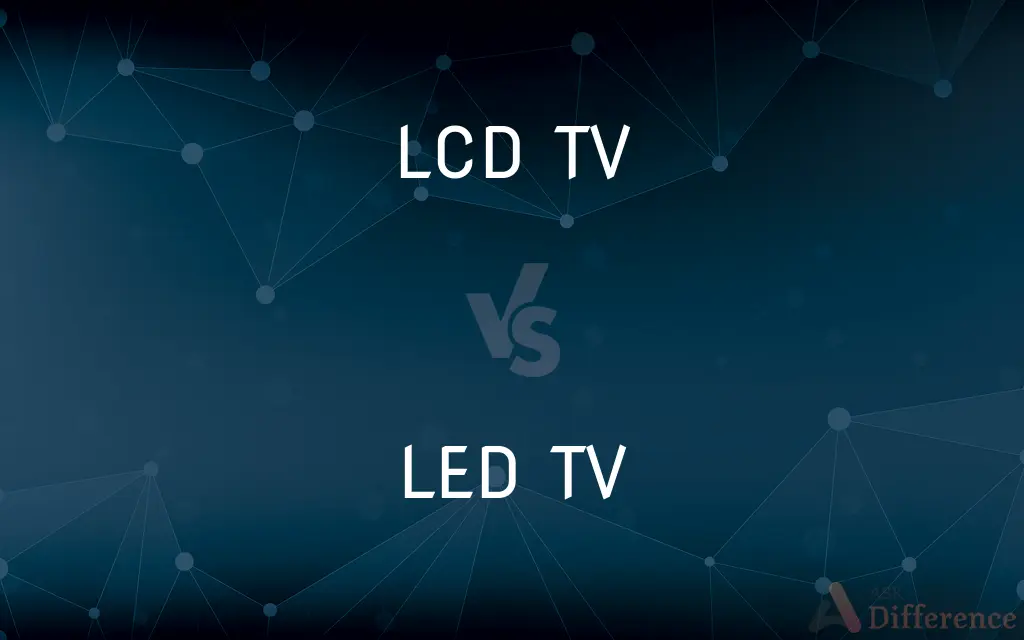LCD TV vs. LED TV — What's the Difference?
By Tayyaba Rehman — Published on October 18, 2023
LCD TV utilizes a liquid crystal display to produce images, backlit by fluorescent lamps, while LED TV, technically an LCD TV too, uses light-emitting diodes for backlighting, offering better picture quality.

Difference Between LCD TV and LED TV
Table of Contents
ADVERTISEMENT
Key Differences
LCD TV and LED TV are common terms used to describe types of television display technologies, but they often create confusion due to their similar acronyms. LCD TV stands for Liquid Crystal Display Television, which utilizes liquid crystals to produce images and is traditionally backlit by CCFLs (Cold Cathode Fluorescent Lamps). In contrast, an LED TV is also based on liquid crystal display technology but is backlit by LEDs (Light Emitting Diodes), offering enhanced picture quality, energy efficiency, and longevity.
The underlying technology of LCD TV and LED TV is essentially the same; both rely on liquid crystals to create images on the screen. The significant difference between them lies in the backlighting technique used. LCD TVs use fluorescent lamps to illuminate the screen from behind, which can result in less color accuracy and lower contrast ratios compared to LED TVs. LED TVs use smaller, more energy-efficient light-emitting diodes, allowing for better control of light and color, enhanced contrast ratios, and sharper, more vibrant images.
In terms of design and aesthetics, LED TVs usually have the edge over LCD TVs. LED TVs are capable of being produced much thinner and lighter due to the compact nature of LEDs. This allows manufacturers to create sleek, modern designs that are more appealing to consumers. LCD TVs, due to the bulkier CCFLs, are generally thicker and heavier, limiting design possibilities and impacting the overall aesthetic appeal of the television.
When considering energy consumption, LED TVs are generally more energy-efficient than LCD TVs. The use of light-emitting diodes consumes less power, reducing energy bills and making LED TVs a more eco-friendly choice. LCD TVs, with their reliance on fluorescent lamps for backlighting, tend to use more energy, contributing to higher energy bills and a larger carbon footprint.
To sum it up, while LCD TV and LED TV both employ liquid crystal display technology to produce images, the difference in backlighting, design, energy efficiency, and picture quality make LED TVs a more advanced and popular choice among consumers looking for enhanced viewing experiences.
ADVERTISEMENT
Comparison Chart
Backlighting Technique
Uses CCFLs (Cold Cathode Fluorescent Lamps)
Uses LEDs (Light Emitting Diodes)
Picture Quality
Lower contrast ratios, less color accuracy
Higher contrast ratios, more vibrant colors
Design & Aesthetics
Generally thicker and heavier
Thinner, lighter, and more modern designs
Energy Efficiency
Consumes more power
More energy-efficient
Popularity
Less popular due to older technology
More popular due to enhanced features
Compare with Definitions
LCD TV
A television that utilizes liquid crystal display technology, backlit by fluorescent lamps.
The LCD TV offers a cost-effective solution for basic viewing needs.
LED TV
More energy-efficient, resulting in lower energy bills.
Opting for an LED TV is an eco-friendly choice, contributing to energy conservation.
LCD TV
Generally has lower contrast ratios and less vibrant colors compared to LED TV.
For more accurate color representation, many prefer models other than the LCD TV.
LED TV
An LCD TV that uses light-emitting diodes for backlighting, enhancing picture quality.
The LED TV is renowned for its sharp, vibrant images and superior contrast ratios.
LCD TV
Characterized by thicker and heavier designs due to the use of CCFLs for backlighting.
The bulky design of the LCD TV is less appealing to modern aesthetic preferences.
LED TV
Offers sleek, modern designs due to the compact nature of LEDs.
The slim profile of the LED TV blends seamlessly with contemporary interiors.
LCD TV
Offers a cheaper alternative with decent picture quality for budget-conscious consumers.
The affordability of the LCD TV makes it a viable choice for many households.
LED TV
Generally more expensive due to advanced features and better picture quality.
The higher price tag of the LED TV corresponds to its enhanced viewing experience.
LCD TV
Consumes more power, leading to higher energy bills.
Choosing an LCD TV may result in increased energy consumption costs.
LED TV
Popular choice among consumers seeking high-quality viewing experiences.
The myriad of benefits make the LED TV a preferred option for many.
Common Curiosities
Does an LCD TV have lower color accuracy compared to an LED TV?
Yes, LCD TVs generally have lower color accuracy and contrast ratios compared to LED TVs.
Do LCD TVs consume more power than LED TVs?
Yes, LCD TVs usually consume more power due to the use of fluorescent lamps for backlighting.
Is the picture quality of LED TV superior to that of LCD TV?
Yes, LED TVs offer superior picture quality with higher contrast ratios and more vibrant colors.
Do LED TVs have a modern aesthetic appeal?
Yes, LED TVs offer sleek, modern designs that are aesthetically appealing.
Can LED TVs be made thinner than LCD TVs?
Yes, LED TVs can be manufactured thinner and lighter due to the compact nature of LEDs.
Are LCD TVs a more cost-effective option?
Yes, LCD TVs are generally more affordable, making them a cost-effective option for basic viewing needs.
Is LED TV more energy-efficient?
Yes, LED TV is more energy-efficient, reducing energy bills and carbon footprint.
Is an LED TV technically an LCD TV?
Yes, an LED TV is essentially an LCD TV that uses LEDs for backlighting.
Are LCD TVs generally thicker and heavier?
Yes, LCD TVs are typically bulkier due to the use of CCFLs for backlighting.
Share Your Discovery

Previous Comparison
Nursery vs. Lower Kindergarten
Next Comparison
Pyramid of Biomass vs. Pyramid of EnergyAuthor Spotlight
Written by
Tayyaba RehmanTayyaba Rehman is a distinguished writer, currently serving as a primary contributor to askdifference.com. As a researcher in semantics and etymology, Tayyaba's passion for the complexity of languages and their distinctions has found a perfect home on the platform. Tayyaba delves into the intricacies of language, distinguishing between commonly confused words and phrases, thereby providing clarity for readers worldwide.
















































